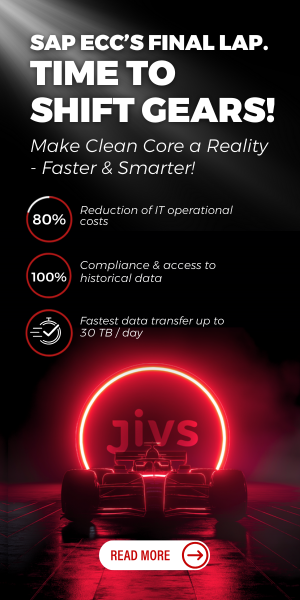For Gen Z, TikTok is the new search engine – and SAP’s Vivien Boche knows that ideas sell best in a digestible, 60 second video.
While SAP superstar Vivien Boche may prefer to introduce herself humbly as an “extroverted nerd”, her achievements speak for themselves: over 12,000 followers on LinkedIn, a regular keynote speaker and evangelist for platform technology and women in tech, and appointed before the age of 30 as a senior director at the SAP Center of Excellence.
ERP Today spoke with Boche about how she has shaken up the workplace with a fresh, modern approach to engaging clients in SAP technology, the storytelling and people skills she’s built along the way, and the challenges which come with being a hyper-visible and successful woman who is making significant strides in the industry, with no plans to slow down anytime soon.
Grace Barrington (GB): Why do you credit yourself first and foremost as being an “extroverted nerd”?
Vivien Boche (VB): What I mean is that I know a lot about technology and can talk to our customers and understand their technical and business challenges, [but also] empathize with them and have a conversation about what they’d like to do. It’s really useful that I can also talk about [technology] on various different levels. There is obviously the very high level where you need to have a very short answer and explanation, or you need to go very deep and in detail about how things are working.
GB: For young professionals wondering how you’ve achieved so much, how did you get here?
VB: What’s encouraging is that I don’t have a technical background and nowadays I work in a very technical role. I studied Economics and then had the pleasure to study at four different universities in four different countries (Germany, Sweden, Denmark and the Netherlands).
When I did my Masters in Copenhagen, SAP had this student program where they bring students, their customers and SAP together, and they give them real-life customer cases to solve with the help of innovative technologies (e.g. AI, digital twins…) And I was like – this sounds amazing!
I started to work at SAP, in Denmark. Then I got selected for SAP’s talent program where you get sent to a training program in Silicon Valley, America for half a year. After that, I moved to the UK, working in a solution advisor role centered around innovation and the technology platform SAP BTP. So, I’m a German who works for a German company but has never worked for them in Germany!
In my UK role at SAP, I worked with customers one-on-one, and I really enjoyed that. [But] what I noticed was we often were talking on a very deep level and that’s the time where I also watched a lot of TikTok videos…
GB: So you started making TikTok-style videos that explained SAP technology in short, digestible ways. It’s fair to say they took off! Now some call you a “corporate influencer”…
VB: Yes. People nowadays call me a “corporate influencer” because I’m sharing – not only those TikTok-style videos – but generally different interests in tech news, innovations, women in tech and career growth tips.
 Besides that, I established myself as an expert in this technology platform space [and] got offered a role in the SAP Center of Excellence – which is quite unusual for someone my age. It came down to hard work, knowledge, expertise, consistency and the leadership believing in you. And I am very happy they did because I was the only woman in the team when they offered me that role. Which was scary, I will not lie, but I also thought, somebody needed to be first.
Besides that, I established myself as an expert in this technology platform space [and] got offered a role in the SAP Center of Excellence – which is quite unusual for someone my age. It came down to hard work, knowledge, expertise, consistency and the leadership believing in you. And I am very happy they did because I was the only woman in the team when they offered me that role. Which was scary, I will not lie, but I also thought, somebody needed to be first.
GB: So do you think your appointment at the Center of Excellence was directly connected to your success on platforms like LinkedIn?
VB: Was it only because of social media? No. Is it helpful that you are known? Yes, but your work, your attitude and your results still need to speak for themselves. Your network is not everything.
In my workshop course about professional branding, I teach that it is important that you need a close group of people who speak highly about you while you are not in the room. Surround yourself with people who will mention your name in a room full of opportunities.
GB: What do you think has been integral to building such a strong online following?
VB: It needs to be authentic. With time, people came to me like “Can you please share this…” “Can you please share that…” and I had to say, “I’m sorry, I’m just sharing things that I really believe in”.
For me, it’s worked nicely because I feel like LinkedIn is a lot of blowing a “bubble” which shows that you need to be more human and not this blown up person – and that is what I’m trying to do. For example, I also share negative experiences like being low on energy in January when it is dark outside or when I had a project fail. My genuine philosophy is that I only post when I feel like it; otherwise, it is not authentic.
GB: As you’ve developed more of a platform, have you had to build new types of resilience?
VB: I talked about the positive voices, but the negative voices are of course there as well. Messages, comments when you meet people. I remember I was once eating lunch, having a nice conversation and then someone dropped a really big bombshell… and you just have your mouth full like, I’m not sure how to react to this right now.
I feel that connects to how women have to react to some sorts of comments. In the initial reaction, maybe you are “frozen” a bit. But then what? Should you just laugh it off? Should you make a face? But maybe then you are “unfriendly” or they say: “Why is she taking this so seriously?” So, it’s a very new form of reality and you have to learn how to work with it. For me, it was not easy, but I was glad to have a strong support network of like-minded colleagues, my fiancé and friends. They encouraged and supported me.
GB: Do you find that through these online, parasocial relationships, people make assumptions about you?
VB: This can be the worst part. People think these posts don’t take a long time. Or make assumptions about the work you do – that you don’t do enough, that you’re not doing anything else.
It’s a bit sad that people aren’t recognizing that every job is hard and there are so many obstacles. For example, I believe 65 percent of my time, I deal with confidential information that cannot be shared online. So naturally, more than half of my work is not visible to people. But people still make assumptions. So, when do I prepare all the content that I share? Before work and after work.
GB: Looking at the positives, how have your posts impacted how people engage with SAP technology?
VB: I have heard people say: “SAP BTP is cool.” “SAP BTP is fun to understand.” “I finally get it now.” And that it is associated with a fresher, different look.
I’m always trying to think – okay, what’s the best way to digest this for the other side? Because if I don’t even understand things, and I do this day in and day out, then how should a customer or a partner understand it? So, this is where I’m trying to revisit the content and adjust it, and that’s where the responses from people have been really positive.
GB: What have you learned through this process?
VB: First, it’s super hard to simplify things. It’s harder to explain things in two minutes than it is in ten, thirty or sixty.
The other is learning how to explain things in different forms. If I am talking to friends who have never heard about SAP BTP, I can explain things. I can talk to people who have maybe heard about SAP BTP. And I can talk to people who are really professional experts. You need to know how to adjust your language. And I think that is a skill which ideally everybody should learn, but it’s not easy.
We often fall into the trap of using similar language for every occasion. As we are technical experts, people tend to go very deep from the beginning, instead of establishing the ground first.
Another learning is that you need to deliver bitesize chunks. Because what I often see is that people display all their information at once, for example on a slide. [But] you actually should just build it up. You should start at the foundation and say, okay let’s learn this first, then we look at this, and then we look at this, maybe you have some animations or, and you do it in bitesize areas because the human brain is just capable of learning step by step.
To sum up, I’ve learned how to simplify, adjust my language to every audience and deliver bitesize chunks.
I ask people to really keep an open mind, saying yes instead of no.
GB: What are the skills you think young professionals can bring to the workplace?
VB: For me, it’s about politely challenging the status quo. Just because things have run this way doesn’t mean they need to continue like this. So, I always encourage [people I mentor] to speak up, to raise questions – because this is something that I have noticed does change things.
Also, I think this hunger for doing something – I see it a lot when people are joining an organization, maybe from university, or have worked one or two years, that [they] bring the hunger and energy. But then they get to a stage which is like five or six years in the job, where they are slowly losing it and then it’s like “Oh, this is a day-to-day job”.
Keeping this hunger and this energy to say “Hey, let’s change things around”, that is also something which I also try to force myself to do. But also try to find like-minded people and say: “Hey, let’s do something, let’s change something, let’s find a project that energizes us that we can work together on and believe in.”
I ask people to really keep an open mind and keep on saying yes instead of no. I often hear things like “Yeah, but…” or “We have already done this” and I think if you’re using these terminologies, just delete them out of your vocabulary.
GB: So you feel that it’s important for managers to create room for their employees to try new ideas?
VB: I think there should always be space where you can explore what my current manager calls “pet projects” – finding something that you are passionate about and can spend ten percent of your work time on.
A lot is also about observing and taking a third-eye perspective. Thinking, okay, the company is running in this way and we have this process, we do this in this way – but you might have an idea for going a different way. And I feel like me doing the simplification of complex technologies was exactly that. I observed that all the explanations of SAP BTP were lengthy. I observed that all the slides were lengthy and weren’t really broken down at the time. So, let’s try and find a format that really boils it down to its essence. And then you figure out a process for making it happen.
So, I feel everybody should try to get time to work on their ideas, and every manager should encourage it.
Perfect is actually the little brother of not doing it.
GB: What would be your advice to people who want to establish themselves more online?
VB: Do it. Don’t overthink it, just do the first part, even though it’s not perfect – perfect is actually the little brother of “not doing it”.
GB: And where is all of this hard work heading for Vivien Boche?
VB: I don’t know where I want to go in five years, but I do have the dream of being a CTO one day.






